Profiles
To learn more about some of the 2015 speakers, check out these brief interviews and be sure to return — more will be added as the event date approaches.
Meet Speaker Jackson Jhin (Session 1)
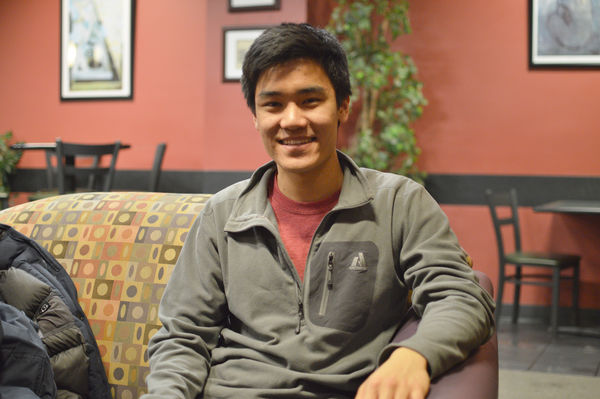
TEDxUND talk title: “Transforming Noise Into Music”
Can you share your motivation for your talk?
I was really interested in the human experience of music—and not just how genres and cultures define as music. For example, if you ask someone about Western music theory, they’d name things like melodies, harmonies, scales. But if you look across the world, other cultures don’t use even the same twelve pitches in an octave. So what is it that defines music? Because it’s not certain pitches. It’s a balance between predictability and variability. It’s not any one variable; it’s many of them, and it’s keeping them in balance. If you have something that’s too predictable, it feels like pointless repetition and the audience will become bored. On the other hand, if something is completely random and without pattern, it won’t be enjoyable, either. So in the middle, you find a balance. And while it’s not a specific definition, it does say that the more your variables are in balance, the more people will enjoy your music.
Everyone has a different preference for music, and I think their preferences are, in fact, just a spot on that spectrum. The human experience of music is like any other artistic experience, like reading a book.
How did you come to synthesize these ideas?
I compose music and am passionate about music production. When I was going through the composition process, I struggled not with coming up with inspiration, but, rather, sifting through ideas to find something that will be appealing not only to me, but to other people. I was looking for this answer: what is it that’s appealing to other people? It’s not just one set of chord progressions or melodies. But to appeal to a large audience, it’s about making something that’s interesting without being too random.
It all stemmed from my question, “What if you were born on a desert island?” If there were no culture, no society, what would music be to you?
Any concerns?
I use a lot of musical demonstrations and synthesizers in my talk. I also have to time the music to the animation while talking at the same time. So I need to practice balancing these parts.
Anything else?
Part of my conclusion that I hope to convey is that music is not only a balance, but, really, all our human perception is a balance. Balance between complexity and simplicity, predictability and variability, is what defines our experience and our tastes. When people talk about music, you understand that everyone has a different perception. At the same time, there are common threads between genres. Even if genres have different rhythms, different pitches, there’s still something that ties them together.
What advice would you give a past self?
I would tell myself to have formally practiced more instruments. When I was a little kid, I didn't understand that formal instruction was important. I ended up learning guitar through YouTube. But I wish that I had a stronger formal background in music. There’s just something about formal training, at least in our musical culture, that bridges the gap between what you see and what you play. I can use computers now to compose, but because the composition world is very much paper-notes-staff, if you haven’t practiced enough, it’s hard to hear the notes in your head and visualize what you want to create.
Meet Speaker Alesha Seroczynski (Session 2)
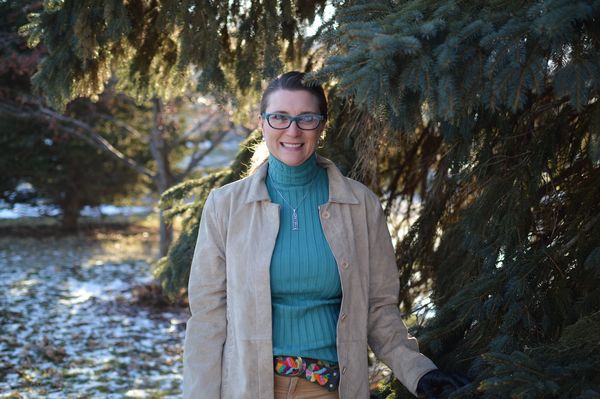
TEDxUND talk title: “What if Juvenile Offenders Met Aristotle?”
Can you preview your TEDx talk?
About ten years ago, I discovered an incredible story: Harry Potter. I was just reading it for fun, at the urge of a good friend and colleague. And as I combed through the story, I found that Rowling had the opportunity to teach kids about great values values. I drove away from a conversation at McDonald’s with a friend, and thought about all the great life lessons in these stories. I thought, “Who needs this the most? Marginalized youth. And who are the most marginalized? Juvenile delinquents. We’ve written them off. Maybe these stories could help them. “
So I merged this idea with the classic idea of virtue theory, which was made popular by Thomas Aquinas. And the rest of my TEDxUND talk is where I went from there: forming Reading For Life.
Over 500 kids have gone through our program at the Juvenile Justice Center (JJC), and only 3% have returned to the juvenile justice system. And it’s not just that they’re not reoffending; they have hope. They’re becoming responsible citizens of the polis, the way Aristotle thought they should be. They’re walking away from bad relationships and engaging in healthy ones.
Reading For Life isn’t just a program; it’s a life-changing experience for some kids. And some of them have even said that they don’t know where they’d be without this program.
Especially in an academic setting, different disciplines and different departments don’t always interact. They can be siloed. And that’s sad, because that’s not within the values of liberal arts. The liberal arts are meant to be holistic and integrated. I was one of the first psychologists to really start talking about virtue theory, and to bring together conversations in psychology and theology. Because, truly, all disciplines should connect.
And this is what we do with the kids. We take them all the way back to the ancients, to Aristotle. We show them that Aristotle thought enough about the kind of life he wanted his own son to live that he wrote down how to pursue that. It can be boiled down to virtues, but it’s also much more than that.
What kind of books do kids in Reading For Life read?
I’m a huge proponent of Harry Potter, but I’ve found that there are a few kids who don’t like him. His world is rooted in fantasy, while the kids live gritty, real lives. They want something rooted in reality. So what’s cool to them is not always Quidditch. I’ve found what’s cool to them is how Hatchet survives the plane crash, or Jack London’s rugged, individualistic survival stories. And even The Passage is popular: it has vampires, but it also raises questions of medical ethics, shows a post-apocalyptic society.
We’re always on the lookout for what’s popular with kids right now. It’s not quite what schools do; we look at what kids all over the world are reading as we speak. A few of our mentors have connections in the YA network; through them, we’ve been able to have some YA authors to Skype our group. Justin Cronin has skyped us; Gae Polisner visited us and spoke with the kids; and another author is coming this spring.
Can you recall an especially moving story from Reading For Life?
One boy especially comes to mind, who chose The Watsons Go to Birmingham—he’s a light reader, but it’s a tremendous story. And the PTSD that the protagonist endures when he thought his sister was dead mirrored what the boy suffered when his father was electrocuted at work three years earlier. He hadn’t talked to anyone about that. Ever. At the final presentation, his mother approached us, weeping, saying that this was the first time the boy had talked about his father’s death.
We have the kids go around and say the most important thing they’ve learned. The last boy who spoke last year said that the most important thing he learned was the idea of being a virtuous person.
Addressing kids at this age is critical, I think, because they’re at a junction in their lives. They’ve taken a step onto a path that keeps going, and it’s really, really bad. So we say, “Stop right here. Take a step back, go back to the crossroads. Consider the virtuous life.” We examine what the “good life” means, and the value of each virtue. If they choose this way of being, the end result is a different place. And they’re diametrically opposed.
The need to ground this program in a theory, and make it scientifically sound, was imperative. There are a lot of fly-by-night programs in juvenile justice: people don’t know what they’re doing. They think something works, but they don’t collect the data to know its success. So from the get-go, I wanted to make sure we had a sound theoretical orientation, that we collected data, and that we would know where we would end up. Because if you’re not going to help, then leave. You can do more harm. It’s not a null effect; these are kids. And we didn’t want to do harm.
Last year, Gae Polisner said this was the best-behaved group of kids she had ever addressed. We gave the kids the book a few days before, and almost all of them finished the book beforehand. They had great questions. They were engaged. These are the kids who missed out: they missed the field trips to Chicago. They sat in the principal’s office when an author came to speak. They’ve always been on the outside looking in, tapping on the glass, wondering what it would be like. Here, we deliver. We say, “Your life is worth this. You’re worth enough for a published, New York Times bestselling author to talk to you.” And then they begin to believe it. That’s the beauty of hope. Once it takes flight, it’s contagious. Contagious in yourself, too. You can’t stop it.
Meet Speaker Garrett Blad & Brittany Ebeling (Session 2)
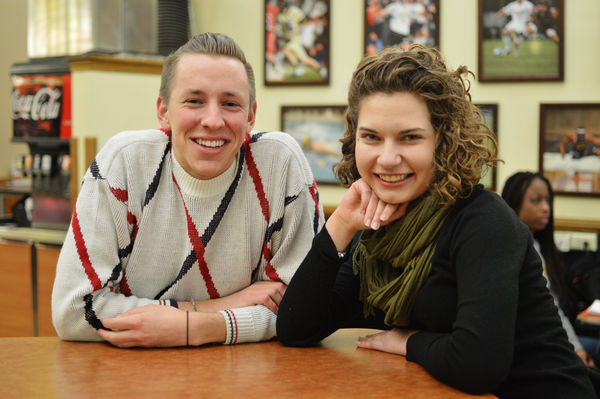
TEDxUND talk title: “What If We Got Uncomfortable?”
What was your motivation for doing a TEDx talk?
Ebeling: We wanted to provoke something universal in this talk—something that we experienced when we first met on the People’s Climate Change March in New York. We had this same discomfort over a lot of the things we were seeing and experiencing on a march that was supposed to be unifying. That experience spurred dialogue about how we can expand the topic of discomfort to those areas of our lives that require a deepening of empathy, broadening our circles of moral responsibility, and realizing that personal actions implicate us beyond our circles of comfort.
Blad: This is beyond doing something every day that scares you. It’s more profound. It’s about finding discomfort and trying to understand it at a deeper level.
So why did you two write this talk?
B: We started talking about it that weekend in New York in September. That was when we first met for an extended period of time. We talked about it for most of the weekend, and continued the conversation when we got back on campus. I distinctly remember several times talking about it. Once we talked for hours on Stonehenge. We spoke specifically about a discomfort about being at Notre Dame, and the privileges that come with that. And we were both in several classes that were talking about social justice, and all these issues were hitting us in the face. We were at a loss of what to do with that, so we decided to apply for a TEDxUND talk to try to express and elucidate this.
Do you answer the “what if” in your talk?
E: It’s more to us as a frame of thought. As Garrett mentioned, it’s much less about challenging yourself to do something new that easily fits into your everyday routines. In fact, I think it’s much less personal than we’d like to believe. It’s more broadly societal, and trying to conceptualize how a frame of thought can be used to identify ways in which you might act upon feelings that, in some ways, are inevitable. But we’re also encouraging thinking it out more deeply.
Any concerns in giving your talk?
B: It’s like we’ve talked about—really trying to hone in on this idea of discomfort, because it can have a multitude of manifestations in every person. We’re trying to make sure everyone can understand it without examples that might take away from the meaning that we’re trying to convey.
E: One of my concerns is either being too specific or too broad. The specificity of discomfort that students will experience by virtue of being at Notre Dame is different from what we’ll speak about in a universal sense. That’s a difficult pattern of thought to break out of. While we’re here, many of our tasks are academic. It’s very one-track. And while that’s easier to speak to, the task of our lives is much more rooted in empathy. My greatest fear about the talk is being able to walk that line, between specificity and broadness.
Anything else you'd like to share?
E: We could talk for a semester about this and not delve into the fullness of it. But I think that, really, our talk is a call to have conversations. I’m constantly thinking of Mario Salvio’s speech at Berkeley, calling students to “throw themselves into the gears of the machine”. Students actively have the obligation to fight against times when a university acts more like a corporation. I hope that our talk provokes a lot of controversial dialogue.
If you could give a piece of advice to a former self, what advice would you give them?
B: I’d tell former Garrett that you are where you are supposed to be. I struggled with my place in life very early on, especially coming to Notre Dame. It wasn’t my top-choice school. And I struggled with going to a liberal arts school versus an art school, with internships, with my major, with figuring out what I want to do in life. And at each turn, it seemed to reassure me that I was where I needed to be. And I only learned that rhetoric after starting yoga here on campus, with a good friend of mine, Katie. She’s taught me more to be gentle with myself. That’s one of the mantras of yoga: “You are where you are supposed to be”, accepting your place in life, and knowing you have a reason. That would have done wonders for me four years ago.
E: I often think of this line from Big Sur by Jack Kerouac: “Is Virgin you trying to fathom me?” It’s written at a part of the book where a man is standing at the ocean, staring at it, wanting to write about it. He’s trying to grasp it, to capture it out on paper. And the ocean calls out to him, almost laughing at him, reminding him of his smallness. In thinking about that, what I wish for younger me is to hold strong and maintain in knowledge of how small I am…and to endure boldly despite that. I love what Garrett said about having a sense of place, to live in the dual reality of that smallness. To resonate in the idea that there’s power in becoming. And I think that’s my journey here.
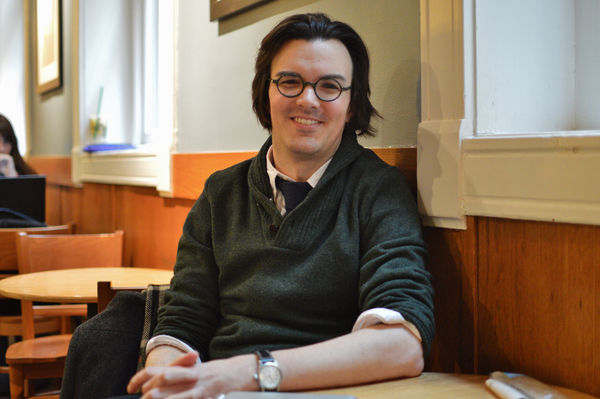
Meet Speaker Mark Doerries (Session 2)
TEDxUND talk title: “What If Children Were More Than Cute?”
What was your motivation for doing a TEDx talk?
I am the director of the Notre Dame Children’s Choir, which consists of two parts: we educate about 120 children in the community. It’s a free program after school. I also teach music education to the sacred music graduate students, and they go into the classrooms and become the teachers for our children. I run the oldest choir, which will perform at our TEDxUND talk. The premise we’re challenging is the response some have then they see children: thinking they’re “cute”. That’s a very dismissive statement. And some people look at children as being immature and without a voice that deserves to be heard. We are trying to challenge that premise. The outline of our speech is as follows: I’ll talk about my unusual journey into this position, and how my mindset has changed. Then one of the members of the choir will come out and talk about how it is they want to be perceived. Finally, we’ll go on to sing a very complicated piece. Pieces are still falling into place within the choir.
In auditioning some of the students to decide who will give a one-minute speech, I learned more than I anticipated I would. They don’t want to be called “cute” or “adorable”. Even their parents use those words. And the kids say they feel “dismissed” and “embarrassed”. They try to act mature all day long, and to hear someone call them ‘adorable’ is diminutive. But what they do say is that they are future artists, future doctors, future mayors. They have these ideas of themselves, perhaps not fully-formed, but they’re figuring it out. So the choir is a sacred music ensemble, but I provides much more than that, especially in terms of leadership and empowerment.
Last semester was our first year. We had a grant to perform an opera that involves children. For some of the lead roles, which were written for adults, we brought in guests from New York City to play the main characters. It was Noah’s Flood, so Noah and his wife were professionals. And the kids in the program played the children and the animals. They constructed their own costumes and sets. We had designers from the art department and help them physically put them together, but the kids imagined and drew their ideas. It wasn’t just children alongside professionals; the actors took the children under their wing, taught them how to move onstage, gave them voice lessons. We’re defining ourselves as a sacred music program as well as a youth empowerment program, and now we want the children to speak for themselves.
My wife and I don’t have children; I always believed I would work with adults. And I was trained to believe that that was the highest achievable level. I was brought here two years ago—they had a large grant to start this program—and I took it as an opportunity to build something from the ground up, never knowing how much I’d love working with young singers. I was terrified at the beginning. I thought children were loud…they screamed a lot. They were rambunctious. And they are all those things! But they also are so much friendlier than adults are, and they know how to forgive each other. They know how to help each other when somebody skins their knee. I’ve turned a corner, in the sense that this is a very important part of my work now. The children have taught me to be a better children and musician as much as I have told them.
The whole Notre Dame Children’s Choir educates 5-14 year olds. Next year, we’ll add a high school choir. And in the following years, we hope to add a choir for children with disabilities. We were originally supposed to be a 20-voice choir, but because of the success and strong response of the community, we’re 120 voices.
Was this your first idea when you saw the call for TEDxUND speakers?
I’d seen many colleagues’ speeches last year, and started thinking about potential talks to give. My background is in multimedia performance, so I toyed with the idea of having the kids involve some sort of multimedia element in the talk. But, I asked the kids. I explained the talk to them and said, “What is it that you’d be interested in talking about?” And a few of them started talking about how they’re struggling to be mature. So I said, “Let’s talk about that.” We vacillate some days between running around the room and screaming our heads off, and some days being serious musicians. We had a big discussion with all 40 of the oldest choir’s singers, talking about what it means to be “more than cute”. From that, they each wrote their own 60-second audition speeches.
Two years ago, when I started this choir, I would not have said that a child would be able to stand up and articulately do a TEDxUND talk. Not that they couldn’t do it without coaching—but these kids could do it now. And it’s just giving them the opportunity. The content is already there.
Anything else you'd like to share?
The kids and I hope to use the talk to launch a movement. We’re buying a website. And all the kids who wrote speeches are going to videotape these speeches and put them online. We’ll open that up to any other youth anywhere who wants to talk for 60 seconds on the phrase “I am more than cute”, to allow them to upload it. We want to create a space where young people can define themselves, to use their voice to define how they want to be seen by adults. And we’re going to reach out to other children’s choirs because that’s the genre that we’re in, but it’s not limited to just that. The ultimate goal is to the change the way young people are viewed in our community. There’s a whole movement in this country about developing youth boards for corporations and governments. In the South Bend community, there are a couple, but we want to extend it further. Sometimes there are youth councils that advise the mayor, youth boards that advise CEOs for corporations. So we’re trying to lead the charge in our own community here: starting small and building the journey.
Meet Speaker Julia McKenna (Session 1)
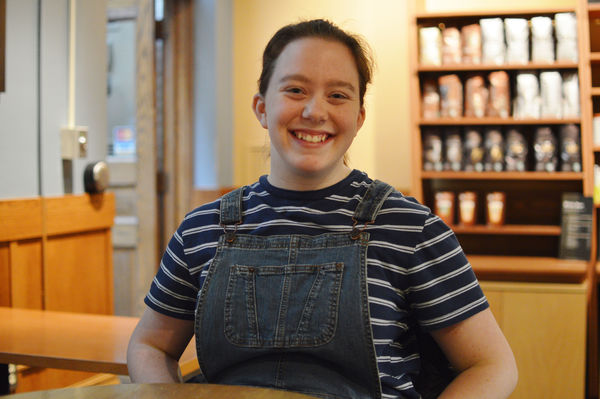
TEDxUND talk title: “If Hands Were Just For Holding and Other What Ifs From a Teenage Poet”
What was your motivation for doing a TEDx talk?
I always wanted to do something I’d never done before. It was a four-day weekend when I told my mom that I was bored. And she said, “You know what? You like poetry, so why don’t you write a TED Talk?” I thought she was kidding, but then I sat down and wrote it! After the interview process, I told my friend that I had been accepted, and she said, “Do you know how to give a TED Talk…?” And I said, “No! But I know how to write poems.” So I took the poems that I wrote and ran with it. This is everything I’ve ever wanted to say, but never have. It’s hard for me to explain that without reciting the poems!
I took to the theme “What If” because I’m thinking about that all the time. You know, I’m a teenager. We tend to over-think things. I kept thinking, “What if this happened?” And part of poetry really is the whole idea of “What if?” Poetry wouldn’t be interesting if it wasn’t suggesting ideas that haven’t been thought of already. It’s kind of all the what-ifs that I know how to say, in a way that I know how to say them.
I think people get slam and spoken-word poetry mixed up sometimes. Slam poetry just feels like spoken-word poetry, but angry. That’s not always the point of poetry. There are times when having emotions in a poem is really important, but the term “slam poetry” gets abused all the time. People think about it as just a rant. But I love the idea of poetry being read aloud. I love the idea of reading what you’ve written, and someone will listen. So I won’t call it “slam poetry”, because it sounds like I’m going to hit you with my ideas and you’re going to listen! We’ll go with spoken-word.
Poetry is the way that I know how to talk about what’s going on in my life. I think there’s beauty in that, that it becomes a kind of sacred act reserved for really understanding my surroundings and myself.
Why poetry over prose?
There’s just something about poetry. You don’t have to develop a plot. It’s already there. Poetry is the culmination of my actual life and my fictional life. Last year, we did a poetry cycle, and my teacher asked us all to write what we know. What I wrote was probably the best thing I’d ever written. I performed it at the poetry slam—the first time I’d ever performed anything—and scored a 9.9/10, the highest score of the night. That was the first time I saw that art and life don’t have to be separate. I think poetry is my way of combining those two. Poetry can be the escape that fiction is, but it also grounds you in reality.
Meet Speaker Susan Jackson (Session 1)

TEDxUND talk title: “Creating Collaboration from Contentiousness”
Please share a preview of your talk
I’m going to talk about lessons that we’ve learned by taking not only competitors within a stakeholder segment, but also competing or adversarial stakeholder segments, and taking this to work together to solve a problem.
What inspired you to write this talk?
I was an economics major at Notre Dame, and I was always interested in business. I went on to law school and, through a circuitous path, became a lawyer working on Starkist Tuna’s legal issues. And then, going back to the business side, I went to the business side of Starkist. Starkist was one of the founders of the International Seafood Sustainability Foundation (ISSF), and it has elements of law, business, science, government-industry relations, and global knowledge. What had felt like a nonsensical career path finally made sense to me.
The ISSF only works on tuna. Right now, everybody’s into the multi-stakeholder collaboration model. We did it six years ago, when nobody was into it! Recently, I’ve been invited to talk about this for a few small events. But my husband noted, “Your model is bigger than your niche.” So we thought of a way to shift our audience from the very specifically tuna-related, and to instead take a step back and understand the collaborative work involved. We thought TEDxUND would be a great platform for this. When Notre Dame first tweeted they were looking for speakers, I went back to my coworkers, I said, “This is it! This is a great way to connect with the community.” I have three conclusions, kind of like matryoshka dolls. They go from global to mission-driven to Notre Dame audience-related takeaways.
Getting a presentation up on the screen is always the most stressful part of any event. That’s something I always worry about. I think the presentation will be fun, though. The most challenging thing will be to make my talk memorable among all the other outstanding talks that day.
How will you make yours memorable?
That’s a secret! All I can tell you is that it does not involve pyrotechnics…!
What’s your strongest memory of Notre Dame?
I’d say my most vivid memory was something that, at the time, we knew needed to be a vivid memory. It was the last home football game, where you’re standing on the 45-yard line, it’s freezing, it’s miserable. It was probably snowing. Our last year was Jerry Foust’s last year. And we were all just standing there saying, “I don’t want to leave.” …partly because I realized that never again in my life would I have seats like this for a football game!
Meet Speaker Grace Agolia (Session 2)
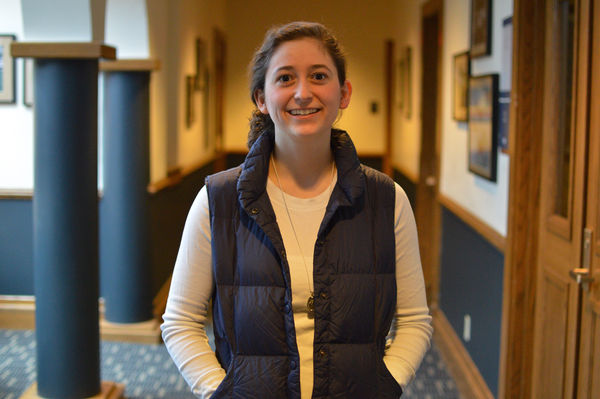
TEDxUND talk title: “Deaf Child Area: Reconciling the Worlds of Silence and Sound”
Can you share the SparkNotes of your talk?
I’m exploring the symbolism of the Deaf Child Area street sign in my life and in society more broadly. Related to that, I’ll talk about my experiences of silence and sound as a deaf person. Silence can be isolating, and not just for me—for people who are deaf and for people who are hearing. But on the other hand, silence can also be beautiful.
What led you to write this talk?
I watched Thomas White’s “Tourette Does the Talking” TEDxUND talk from last year. The organization and content of his presentation was amazing. It made me think that I could give a talk about my deafness. I want to share with other people some part of my story, but even more than that, tell them how deafness shouldn’t be stigmatized. To spread awareness that there’s more to deafness than being a disability. It provides a whole new perspective on the world. I’ve given witness talks before about my experiences with deafness, but mostly about my relationship with God as grounded in silence. For this talk, I want to focus more on societal implications through some of my personal experiences.
Any concerns about giving your talk?
I’m a little nervous that people might misconstrue what I say. For example, when I received a scholarship some time ago, a press release was sent from the organization to my hometown news outlets. The press release portrayed me in a way that I felt didn’t reflect my view of my deafness accurately. It used the phrase, ‘overcomes hearing loss.’ First of all, that’s incorrect, because hearing loss itself isn’t overcome—we don’t have the technology yet to restore natural human hearing. Second, I embrace my deafness as an intrinsic part of my identity. It’s really about overcoming the challenges associated with hearing loss, and the cochlear implant is a tool that I use to help overcome some of those challenges. The cochlear implant itself doesn’t overcome deafness because the deafness is still there. But even with the cochlear implant as a wonderful part of my life, I’m still challenged academically and socially. While the implant is an incredible tool that allows me to communicate with others, it’s not the same as natural human hearing. And for me, there is an auditory delay in how my brain processes language and sound through my processor. In most situations, I’m still behind others. So while the implant helps me significantly I don’t ‘overcome’ hearing loss; I overcome the challenges associated with hearing loss. I have to be willing to advocate for myself and show others that deafness is not something that detracts from the dignity of a person. And again, a lot of this depends on how the individual person perceives it. It’s complicated because there’s a signing Deaf culture, which I wasn’t raised in because my whole family is hearing. For these people, deafness is not something to be fixed. It’s part of a culture, a way of life, which includes sign language and very close-knit communities. If you look at how they interact, it’s beautiful to see how they support one another and adapt to challenges. So if someone from the Deaf culture sees the article, they might be confused and frustrated at the phrase ‘overcomes deafness.’
Can you name an incredible memory you’ve made at Notre Dame?
I’d say that some of my greatest memories are those formed when conversing with a friend and walking together around campus at night. And not small talk—talking about deep things: Existential questions. And while I listen to my friend, I revel in the beauty of the night – the stars and the moon, and campus itself like the illumined golden dome with Mary on top. And it’s moments like those when I’m most appreciative of my time here, and for being able to talk with another person on a more fundamental level; being vulnerable to love and asking each other questions like ‘Who are we? Why are we here? What do we do with this life that we’re given?’
Meet Speaker Pete Freeman (Session 1)

TEDxUND talk title: “What if ‘Thank You’ Were More Than Two Trite Words?”
Can you give the SparkNotes version of your talk?
The phrase “thank you” is perceived as two trite words. There are cultures around the world that have devolved the concept of “thank you” and gratitude into a stockphrase. A boss will ask an employee to copy papers; the employee takes the papers and says, “Thank you.” So it’s like an insert-phrase-here. It’s like “um” — a go-to phrase. The goal of my talk, then, is revitalizing “thank you”—injecting life into it. Making it fun and creative and refreshing. Making it something that can bring a smile to somebody’s face.
What inspired you to give this talk?
I’m obsessed with saying thank you. I say “thankyouthankyouthankyou” three times in rapid succession. This led me to start a small grassroots movement in my hometown to thank community members who deserved it. And they were almost always surprises. So it took “thank you” to a new level. Whether it be drawing, singing, programming an app, anything, we used that to say thank you and surprise somebody. When they receive it, they feel thanked, but also feel the gratitude. It’s not so much about substituting something for “thank you”; it’s more about using something to make the "thank you" more meaningful. Somebody can only run so fast, but if you give them a car, they can go much faster.
Any concerns with giving your speech?
I’m concerned that people won’t react. I’m concerned that people will listen, and then leave and not execute on what I’m saying. It’s not about me; it’s about the change I want to affect. I give a lot of examples and a powerful, emotional punch at the end that I hope fuels the audience to thank others—friends, family, strangers.
What else woulld you like to share?
“Thank you” is a culture and not just a word. Gratitude in and of itself is a way of life. And that’s been talk about for centuries. It’s hard to instill that culture in 10 minutes, so I’m going to attack it with tangible examples.
What has been your biggest inspiration?
First and foremost, my parents. But I’m going to try to give an atypical answer, so I’m going to say the town of Culver, Indiana. Culver was a great mix of regimented, military influence and laid-back fun. Those two things aren’t mutually exclusive or opposite, but they’re different enough that they can feel different. I loved to take it easy as a kid, and I grew into the regimented lifestyle. The structured, ordered lifestyle is responsible for who I am today and why I’m here at Notre Dame; the easygoing aspects are responsible for how I see the world and what I love to do. Without those two aspects, which are unique to Culver, I wouldn’t be here.
Meet Speaker Katie Mattie (Session 2)

TEDxUND talk title: “What if Iron Man was a Woman?”
Can you share the SparkNotes of your talk?
I’m going to talk about why we haven’t attained gender equality in film, what it would look like if we did, and how get there. I’ve always wanted to be a superhero, and I’ve always identified with primarily-male characters, like baby Simba or Jack Sparrow. So my life’s quest has been to become a superhero. I just want to lay a foundation that it’s okay for girls to be bold, and that being bold shouldn’t be viewed as bossy.
What motivated you to write this talk?
I wrote a young adult fantasy novel, self-published, about five teenage girls who get the powers of the Greek gods to go on a quest and defeat the Titans. I’ve had these five teenage superheroes in my life for the last 7 ½ years. Now that I’ve graduated, I’m trying to figure out what I’m going to do. I’m unemployed because I’m self-employed—I’m trying to become a creative entrepreneur. With the book and the talk, I want to spread the idea that kids are their own superheroes. No matter what your family or life situation is, you matter.
What’s a lesson that you’ve learned the hard way?
It has to do with Notre Dame: I only applied to Notre Dame. And that was a terrible decision at the time, because I was deferred and wait-listed. And the way I grew up, my dad always said, ‘If you have a dream, if you have a goal, and you work towards it every day, it’ll come true.’ So it had never crossed my mind that I wouldn’t get accepted. I’d worked hard, and I had done everything I could think of. By April of my senior year, I was worried that I wouldn’t go to college if I didn’t get in. This taught me to hold the vision, trust the process. It’s about you in the moment. So, I was going to have to be okay whether or not Notre Dame happened, and it just so happened that it worked in my favor. I realized that I need to be present in my life, or I’m going to miss it.
Meet Speaker Prashan De Visser (Session 1)
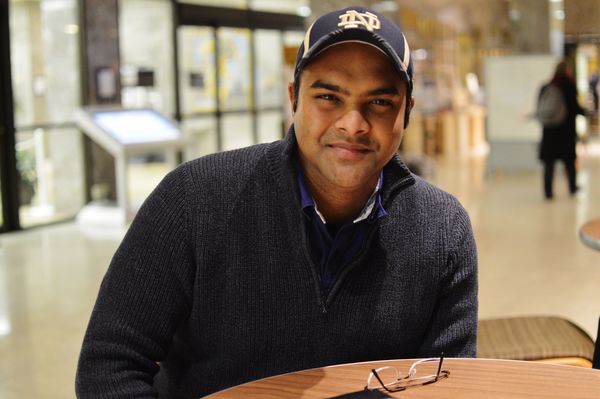
TEDxUND talk title: “Counter Radicalisation of Youth”
Can you share the SparkNotes of your talk?
I’ll be focusing on conflict zones around the world in relation to what’s happening right now. In many conflict zones, there’s been a spike of young people being radicalised and influenced and joining violent outbreaks. So: How do you counter that? What’s your strategy?
What motivated you to submit this TEDx talk?
I’m from Sri Lanka, and Sri Lanka just came out of a civil war five years ago. We had a civil war for 30 years, so I was born in the war and grew up into it. That shaped a lot of who I am, and many times I as a young person was approached by radicals to try to be used as a part of violence. But, because of positive influences in my life, I was protected from that. It also gave me a capacity to see what radicals were up to. I saw what I could have been a victim of, and I saw the victims who didn’t have the same support system I did. So, that led me to start a youth movement for reconciliation in Sri Lanka, even while the war was going on. It’s called Sri Lanka Unites, and it continues to run today. And we were the only youth movement for nonviolence. The movement flourished. We started it in 2006 and we have over 10,000 members across the country. It’s a movement of young people saying, “I’m not going to be recruited. I’m not going to be part of the violence. I’m not going to be part of the hate.” But I really want to see what a united Sri Lanka could look like, where we understand each other’s pain. Where we try to be a solution to each other, as opposed to being the problem that makes others feel like they’re lesser.
The reason I came here was to get my masters in Peace Studies and Conflict Transformation. I wanted to understand the policy aspect of it. You can do grassroots work, but then it has to be coupled with policy changes. So I’m here to work on my policy skills, to work on how to lobby for change from a government’s perspective and bring it together.
If you could give your younger self a piece of advice what would it be?
The capacity to think critically: People can come and tell you whatever they want. They can manipulate your emotions to make you feel like you’re a victim, to mark you with bitterness and hatred. That leads to a lifestyle of bad choices and excuses, and the cycle just continues. So I would tell myself to be aware—When people come and approach you and try to recruit you in any way, to ask: Why are they doing this? How am I going to benefit? How will the country benefit? What are the facts behind what they’re saying?
What else?This is not just a talk and not just information for Sri Lanka. It’s more than that. In the States, we just registered an international program called Global Unites. We are working now in the Congo, Kenya, Myanmar, and ten other countries. I’ll be talking very particularly about this issue. But the issue itself is not just a talk—It’s a movement. And I want it to be an opportunity and a forum for people to hear about the importance of young people—that young people have the power to no longer be victims, no longer be the ones who commit atrocities because they were brainwashed. We need young people to be known for their capacity to transform and impact society. It’s a long journey. But this is a forum to share that, and I’m privileged to have the opportunity to share this with my fellow students and the international audience.
Meet Speaker Dustin Stoltz (Session 2)
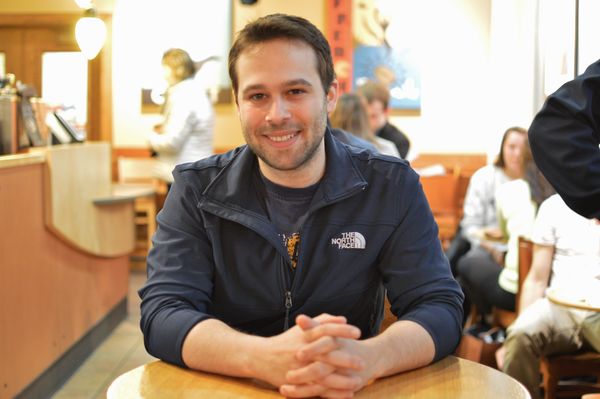
TEDxUND talk title: “Trust is overrated, or how we play nice with strangers.”
Can you share the SparkNotes of your talk?
There’s a lot of emphasis on building trust. We don’t necessarily need trust to cooperate and work together. I did an ethnography in Azerbaijan. Survey showed that nobody trusts anybody. If you look at the answers to “Do you think most people can be trusted”, the answer is affirmative somewhere around 16, 17%. But, you run into situations in which people are constantly working together, giving money and entrusting money to people, and to me, I thought that was a paradox that needed to be examined.
I was in Azerbaijan working on my master’s in sociology in collaboration with the Peace Corps. The actual length of the ethnography took 12 months, but that was once I had it approved, collected information, started conducting interviews—so I couldn’t do anything for a while. I was working on collaboration with a small organization that tutored students—that worked to help them pass the entrance exams for college.
Having faith in people is different from trust. Having faith is something intuitive—the way we approach paper. When you start three, and you try to understand a situation together—when you’re willing to take the risk, to have faith and work together and just go from there, trust is likely to happen. People want to trust—it’s very much a cognitive necessity.
So often, research assumes we’re really distrusting, and that we shouldn’t trust, and that we’re always calculating what someone else will do next. I mean, when I sat down to talk with you, I didn’t even think twice about who you are or what you could do. I didn’t perceive you as dangerous—just as another human being, and I sat down to talk with you. But more often than not, we can trust people. And it’s so newsworthy when a situation arises which involves not trusting someone—and that’s because it contrasts so much with the natural attitude. So really, it’s an overwhelming majority of the time when you can trust people. It’s that fraction of the time when we can’t, and that’s what makes it onto the news and begins to worry people.
I’ve found that if you imagine the worst possible situation and go to that, people will still work together and cooperate. It’ll just happen. Even people who hate each other—who have terrible things to say to each other—will cooperate in these amazing ways. I think that’s a reason to be hopeful.
Who is someone who has inspired you?
This is really difficult for me! Something I’ve learned over time, through studying and through travel, is that all people have the capacity to work together and build amazing things. Even the worst people are fascinating and capable. Even if I don’t like them, they have so much to contribute. It sounds cheesy, but it’s true.
Meet TEDxUND Emcee Brian Snyder
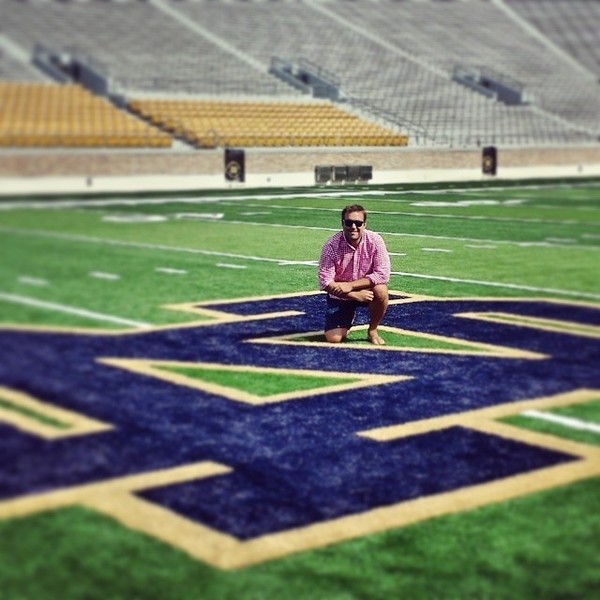
Have you emceed before?
I emceed a battle of the bands in high school that my friends and I organized for the Juvenile Diabetes Research Foundation. We got acts from the local area outside of Philadelphia to come and play. We ended up with about 500 people who came to see it. I’ve gone from introducing rock bands then to introducing TEDx speakers now!
Do you have a specific mindset as an emcee?
I’m going to play the part of the excited audience member. I’ll be looking up who the presenters are, getting to know them a little better before the event to understand what they’ll be talking about. And of course I’ll be following tweets live with the audience, and get some people who are watching around the world in the livestream to interact with us. It would be great to put up a hashtag for each of the sessions, to keep the conversation going long after TEDxUND. A TED talk is only 18 minutes, but they’re just the start of questions, issues, and conversations that could lead to solutions. In fact, I’d love for audience members to start the conversation now, before the Notre Dame event even starts. They can tag me on Twitter @BSniz with the hashtag #TEDxUND and ask questions, check out the speakers, formulate opinions. TEDx isn’t for the hosts, for Notre Dame, for the speakers—it’s for the audience. And it’s the audience that ultimately shapes the culture and results of the event.
If you could give a TED talk, what would you talk about?
I’d first give them my background in digital marketing and communications. My question would focus on this: What does credibility and authenticity mean in the future? Brands now have become media, blurring the line between paid media advertisement and journalistic coverage. So what does that mean in the future? How will we relate to organizations, to brands, to each other? What does it mean to be authentic in this changing world?
As an alumni, what do you think when you hear “Notre Dame”?
Going to Notre Dame was all about the shared experience. Although it might seem trite, the Notre Dame family is a real thing. That’s why people talk about it so often. You immediately connect with someone who even mentions Notre Dame, let alone who is an alum. It’s an instant connection, whether it be in the business world, or meeting friends or in any other circumstance. There’s a spirit of family between Notre Dame graduates.